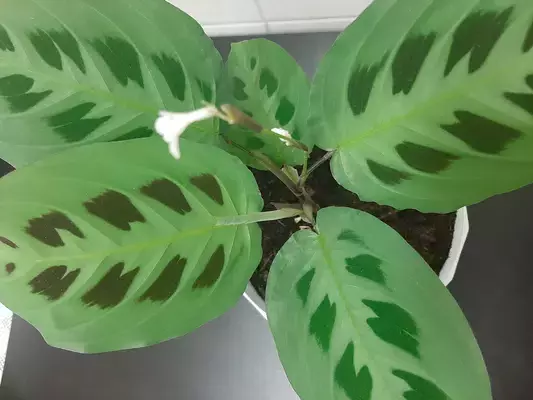Maranta Leuconeura has many varieties, and one outstanding cultivar is Maranta Kerchoveana, famously known as Maranta Rabbit’s foot and Maranta Maranta Green Stripe. Plant owners love Maranta Kerchoveana because of its stunning foliage patterns, mint green color with dark green big spots that look like rabbit tracks across the midrib. Moreover, the contrasting silvery-blue color on the lower side of the leaf makes this plant more unique. Like other prayer-plants species, this also folds the leaves in the night for prayer.
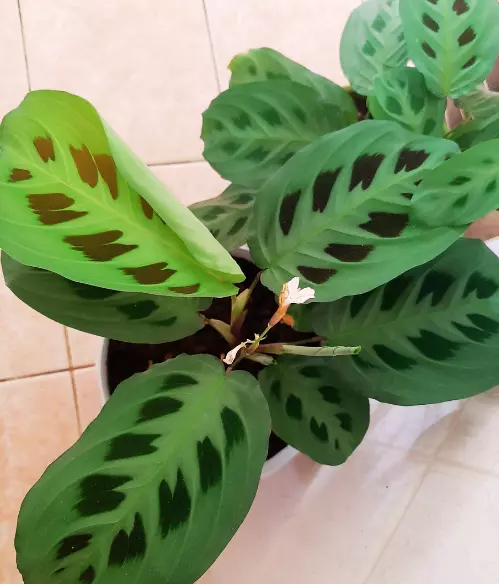
Prominent Family Members: Maranta Lemon Lime, Maranta Arrowroot, Maranta Leuconeura Red Stripe, Maranta Silver Band
Essential Products
How to take care of Maranta Kerchoveana?
The Maranta Kerchoveana is native to Brazilian tropical rain forests, and they grow throughout America as an ornamental house plant. Easy to grow plants with little care! Proper light, temperature, humidity, and moist soil are required to thrive this beauty indoors and outdoors.

Bringing plant home
Don’t forget to inspect your plant thoroughly after receiving it and putting it beside other indoor plants. Please check the plant for any pests or diseases and treat them accordingly.
Beautiful foliage of the Maranta Kerchoveana
We recommend keeping the new plant in isolation for two weeks and then introducing your new plant to its new cozy home!

Light Needs
The Maranta Kerchoveana Prayer plant loves to thrive in shady or diffused bright light as they are accustomed to growing under the dim light of tall trees in the native Amazon.
While making a permanent spot for this beauty, select an area where direct sunlight is not present; if you intend to place it in front of the sunlight receiving window, block the sun rays with a blinder or curtains.
If your plant’s leaves start losing beautiful bright colors, the Maranta Kerchoveana plant is getting excessive light. Please provide shade over the plant or place it in a shaded area.

Kerchoviana Prayer Plant Humidity Requirements
Kerchoviana requires high humidity, 60% – 70%, to flourish. Indoor environments are relatively less humid than outdoor, and plant leaves will have crisp edges or tips, indicating a dry climate with less than 50% humidity.
Please place the humidity levels around Maranta Kerchoveana with other indoor plants to raise the humidity levels. You can also achieve good results by placing the plant on a tray filled with stones and water. Please make sure the pot base is above water level.
Frequent misting can also help overcome the humidity requirements. However, after misting, wipe all excessive water droplets from the leaves; otherwise, fungal diseases may initiate.
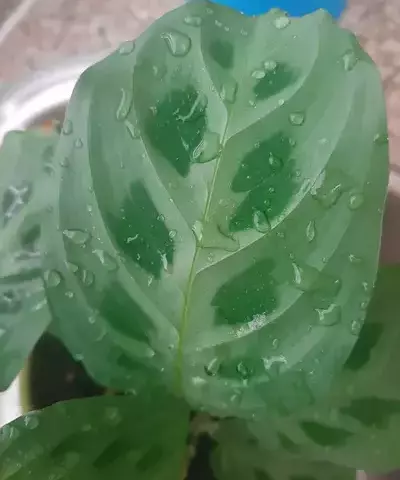
The most effective option is a plant humidifier, which provides the humidity and maintains the required humidity level in the atmosphere. We recommend using a hygrometer to check the humidity indoors.

Ideal Temperature
Maranta Green Stripe hails from Brazil’s rainforests, where the climate is hot and humid throughout the year. Therefore, keep the temperature between 65 to 80 °F to thrive well indoors.
Maranta Kerchoveana cannot tolerate sudden temperature changes; therefore, please protect the plant from ACs and heater vents.

How often should I Water Maranta Lemon Lime?
Maranta Kerchoveana thrives well in moist soil, leaves will start turning yellow, or the plant will begin wilting if optimum moisture is not present in potting soil. Furthermore, too much watering is also detrimental to the plant’s health as overwatering will make the soil soggy and initiate roots fungal diseases.
Maranta Kerchoveana requires more water in the growing season, and you may need to water the plant twice a week. However, finalize your watering routine by checking the potting soil’s moisture level. The upper layer of soil shall be dry up to two inches before watering the plant again.
We recommend using filtered or distilled water, as the plant does not react well to the presence of minerals in tap water.
Note: For a faultless watering routine, use a moisture meter to know whether the potting soil is moist or dry.

Soil mix for Maranta Kerchoveana
For Maranta Prayer, soil plays a vital role in their growth and health. The potting soil must be well-draining and rich in nutrients. It’s recommended to purchase a ready-made soil, or if you want to make your own soil, then mixing these ingredients in given ratios will produce the best results.

Maintenance and Pruning of Maranta Kerchoveana
Cleaning leaves is required once a week to keep dust away from the beautiful foliage, and if you frequently mist for humidity, don’t forget to wipe out the water drops from the leaves after misting.
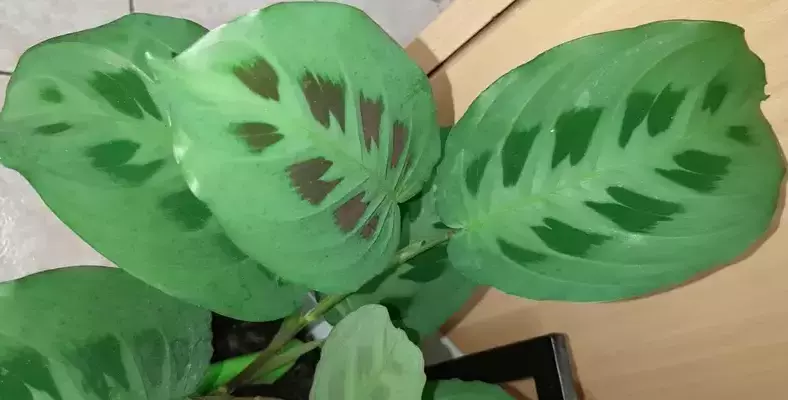
Furthermore, to maintain the plant’s size and shape, prune it periodically. Please cut away all the brown, yellow, or damaged leaves, and shape the plant using a sharp scissor or knife.
Nott; sterilize the tools by using a sanitizer or alcohol swab.

Fertilization requirements of Rabbit’s Foot Prayer Plant
Maranta kerchoveana growth boosts if extra nutrients are provided in the growing season from early spring to late summer.
You may use a 2-2-2 houseplant fertilizer for best results. Always use the quantity as suggested on the package. Please fertilize the plant once a month in the growing season, while in winter no need to feed the plant.
Furthermore, a concentrated fertilizer solution can burn the roots and leaves, so don’t forget to water your plant before applying fertilizers. Water in the soil will make the solution more dilute and less harmful

Re-potting Maranta Kerchoveana
Maranta Kerchoveana is a relatively slow grower plant, and it takes five years to fully mature, so repotting is required when it shows roots coming out from the drainage hole or soil surface.
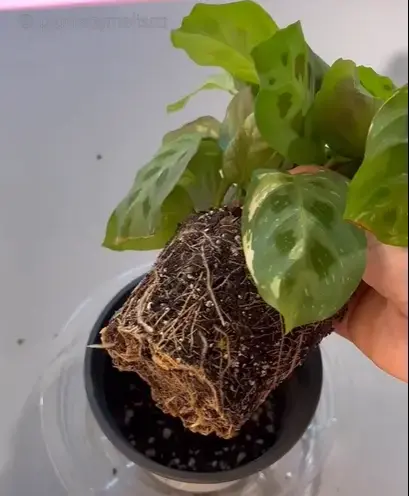
Here are steps on how to report the plant without damaging it

Propagation of Maranta Kerchoveana
There are 4 ways to propagate the plant are;
Water propagation
Following are the steps you require to follow for water propagation.
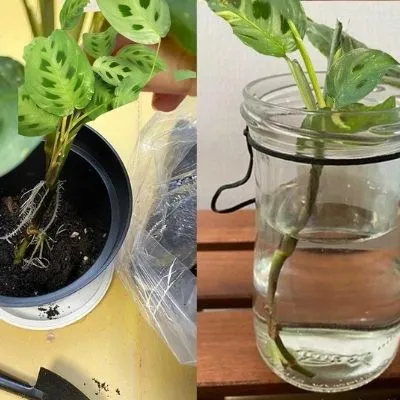
Propagation through water and soil
Propagating in soil
Please cut the stem below the node with one or two leaves, then plant it in moist soil and water it. Wrap the cutting with a clear bag and keep it in a shady area. In four weeks, the plant will start growing. This method is also easy; however, you can’t see the stem growing the new roots.
Propagation through Seed
Propagation through seeds is ineffective for Maranta Kerchoveana, and the propagation success rate is minimal.
By Root Division
Divide the mother plant’s roots into sections, remove a healthy root with shoot with the help of a sharp tool, and plant it in moist soil for growth. Wrap the cutting with a clear plastic bag, and let it grow normally.

Is the Maranta Kerchoveana Prayer plant toxic to pets?
Maranta Kerchoveana is a non-toxic plant and is harmless for pets and humans. So, feel free to let your pets and kids go near and play around the plant.

Kerchoveana Pests, Diseases and Problems
Pests
Spider mites’ mealy bugs and thrips are the common bugs found on Prayer plants. Please maintain a high humidity level around the plant to avoid attack and if any pests are located on the plant, apply neem oil on the infected leaf or wash the leaf with pesticide soap.
Root Rot
Root rot occurs because of overwatering or poor drainage of the soil. Keep the soil moist and use perlite to avoid soil being soggy by improving draining capability. Plant leaves will start yellowing, and wilting will occur due to root rot. For recovery, cut away the damaged roots, replace the waterlogged soil with a new soil mix, and use fungicides to control fungal diseases.
Brown Leaves Edges and Tips
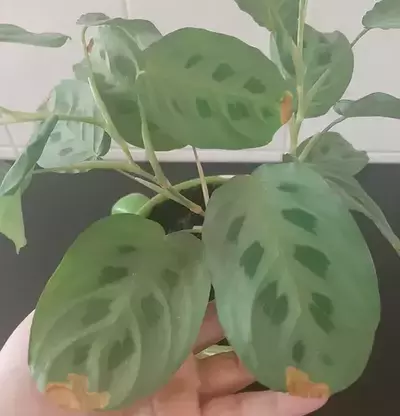
If your Maranta has brown tips or leaf margins , it could be lack of air and soil moisture . If you are not regular with watering or you are not watering very frequently the plant leaves’ tips start turning brown and crispy. Please revise your watering schedule.
Using a moisture meter would help you monitor the soil dryness. Moreover, too little moisture in air also cause prayer plant to have brown tips and edges. You can use a plant humidifier to increase the moisture in the room. Moreover, we recommend using a hygrometer to keep in check of humidity and temperature for better care.
FAQ
Why my Maranta Kerchoveana leaves are turning yellow?
Plants staying long in soggy soil indicate by showing yellow leaves. It happens because of overwatering.
Why do Maranta Kerchoveana leaves curl?
Plants start curling when the temperature is high or the plant is low in moisture. Please remove the high-temperature source and water the plant deeply for recovery.









